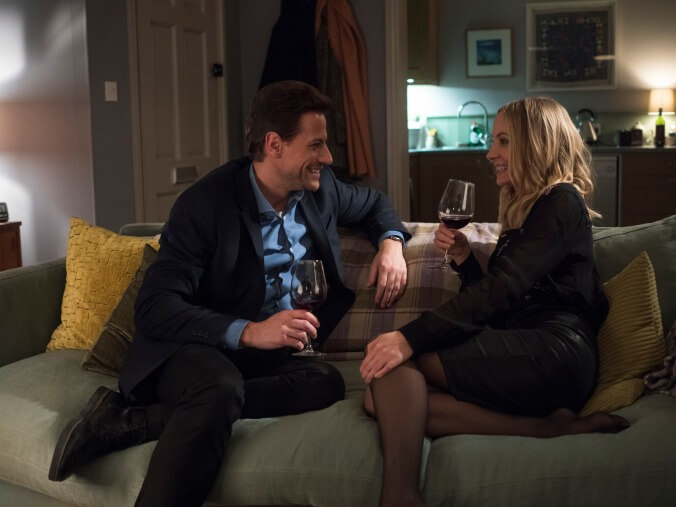Liar turns a “he said/she said” into a gripping psychological thriller

Liar kicks off with the ultimate he said/she said: The morning after what starts out as a typical and innocuous first date, between a recently single schoolteacher and an attractive widower, she says that she was raped. There is no physical evidence and no witnesses, so the case basically comes down to who is more trustworthy and believable. The woman, Laura, has a somewhat troubled history, but the man, Andrew, is a cagey surgeon who could be hiding something. The show is called Liar, because where does the truth actually lie?
It’s unfortunate that this Sundance series starts kicks off right on the heels of Broadchurch’s superior season three, which also explored a rape case. Many scenes are the same: the gathering of forensic evidence, the painful questioning of asking the victim how much she had to drink that night. And, similar to Broadchurch, an otherwise quiet seaside British town appears to be hosting a multitude of residents with secrets, like Laura’s sister, and her ex, and Andrew’s son, who is also Laura’s student.
It certainly sets up enough questions to make the viewer want to tune into the next episode to see what unfolds, which is helpful, since the show gets off to a bit of a slow start. With rapists like Brock Turner getting off with a light dusting of a sentence and the pressure on rape victims to “prove” that they were attacked, posing an entire series on the question of whether a woman is telling the truth about a sexual assault at first seems like a questionable way to go. As with all of these types of accusations, the confounding question remains: What on earth could be her reason for doing so—to ruin the life of a man she barely knows?
Soon, though, Liar wisely reveals the truth before the final episodes, so the series quickly turns from he said/she said to cat-mouse-cat. I don’t want to reveal any more here to spoil the considerable surprises (and do not look for #Liar on Twitter, because the U.K. is already ahead a few episodes), but the tonal shift is as startling as it is breathtaking. The two main performances, on which the entire series rests, are both astonishing: Joanne Froggatt, so solid in Downton Abbey, is captivatingly fragile, swaying from likable to unstable in a matter of moments. And we’re so used to seeing Ioan Gruffudd as the romantic hero, it’s fascinating to see him offer such a multi-faceted performance, effortlessly shifting between the light and the dark.
At first glance, the leads outshine the supporting players so greatly that the rest of the cast is little more than window dressing. And after a D.I./D.S. combo like Olivia Colman and David Tennant, Liar’s investigators seem, at first, like a couple of dullards—although with them as with other characters, there is more than meets the eye. Still, the lack of a single light moment makes the six-hour series a bit of a stretch; Broadchurch is effervescent in comparison. But the subplots fortunately soon heat up, as Liar goes on to explore not just the main story, but the varying gray levels between lies and truth in general. What about the white lie told to help one of Laura’s students? Or another character neglecting to reveal a brief affair, since telling the wronged spouse can only cause them pain? On the other side of the spectrum, a false alibi can mean the world of difference between justice and freedom for a guilty party.
Aside from the philosophical debates it brings up, Liar also offers some considerable leaps in logic, and plot twists so far-fetched they could lose the viewer if Froggatt and Gruffudd weren’t so unbelievably hypnotic. The series also looks appropriately picturesque and haunting, and there’s some interesting camera work and art direction at play: The date between Laura and Andrew, frequently shown in flashback, is always depicted in a lovely golden hue, the players appearing to encapsulate the most attractive date pairing imaginable. The present-day scenes, after the rape accusation, are considerably more washed-out. There are some striking camera angles as Laura leaves the cab for her date, as if someone is watching her, menacingly, from an alleyway. The camera almost appears to be judging as an impassive observer, until stakes are raised and passivity is no longer an option.
Near the end of the series, one character frustratingly screams out, “Just tell me the truth!” and Liar has done what it set out to do—we’re convinced that no matter what unpleasantries it brings with it, the truth is always the best choice. Several characters mention the fact that the truth always finds its way out eventually; the painful reality is that that’s not always the case, but Liar does a lot to mine the depths of that particular subject matter. It might even make you think twice the next time you toss up an everyday white lie or fib: Sure, it’s seemingly innocuous now, but are the ramifications of being found out worse than the truth would have been in the first place?